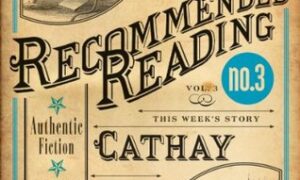 Welcome to Braggsville by T. Geronimo Johnson
Welcome to Braggsville by T. Geronimo Johnson
My rating: 3/5 cats



But we were being ironic when we posted those bumper stickers, protested Candice. Everyone knows we were joking.
Everyone who is our age, probably white, and a college student at a hella liberal school. Don’t you get it? This never made any fucking sense to anyone but us, and there aren’t as many of us as we fucking thought.
i wanted to love this book more than i did, and it’s one of those situations where the parts i liked i really really liked, but the narrative gets a little muddy in places, both in its storyline when it strays from its surefooted plot into less-compelling tangents and also in its voice, where there’s a little authorial tricksiness at play that distances the reader and winds up being more frustrating than clever.
there’s a good story in here, but it gets in its own way by trying to take on too much.
the premise is great – it involves a group of college students in that phase of their lives where they have it all figured out – they know exactly how the world works and they’re not afraid to stridently vocalize the social ills they observe and they have that youthful energy and drive to do something about it. but they’re also too young to have any real perspective or to think through the consequences of their actions. it’s what makes college kids so adorable – all fired up from cutting their teeth on critical theory, thinking that parroting back jargon makes them smarter than their folks, too dumb to know it doesn’t.
the kids in this case are further burdened by being students at the hyper self-consciously liberal berkeley. we have d’aron; a white kid from smalltown georgia where being called “gay” is both a terrible insult and a hilarious joke, louis; a chinese boy whose goal is to become a stand-up comedian and whose racial material is actually frequently hilarious, charlie; a black boy with a prep school background and an athlete’s physique, and candice; midwestern white girl claiming fractional native american blood and on a crusade to fix the world through her passionate causes.
they band together in a tight clique after a misunderstanding at a party stirs up their (or at least the white kids’) insecurities and fears about being perceived as racially insensitive. they call themselves “the 4 little indians,” and unite to support candice’s public displays of protest and righting-of-wrongs, and there’s all sorts of love-polygons running through their group.
when candice learns that d’aron’s hometown sponsors an annual civil war reenactment, they hatch a plan to attend and shock the participants with a “performative intervention” which they will film as d’aron’s american history project.
but it goes very, very wrong.
the novel is a satire, and for the most part, it works very well. it captures perfectly the dangerous confidence of crusading liberal arts students who can’t see beyond their own short-sighted and shiny-new ideologies – pointing fingers without perspective or context, assigning blame and stereotyping people whose sense of tradition might not carry the racial weight they assume. and the delicious irony of how the consequences of their actions cause them to be labelled as the very thing they thought they were unmasking.
it’s funny and clever and also very sad. and scary.
the funniest parts, to me, involve the college experience at its most basic. where d’aron soaks in information like a sponge and uses it to become a smug little judge of the woefully less-educated:
D’aron cringed when she said tragedy. Everybody knows better. The first fact they learned in his course on Greek theater (or in any introductory lit theory class) was that a tragedy arose when one faced two competing claims of equal magnitude. Hence, when Antigone is faced with either abandoning her brother Polynices’s rotting corpse to cook the air in accordance with Creon’s dictates or burying her sibling in accordance with family duty, she faces tragedy. When a drunken idiot falls asleep at the wheel or knob or whatever it is and the subway crashes, that is not tragedy. When the term was first explained, D’aron appreciated the certainty of the definition and the commitment to exactitude the professor’s lecture symbolized, making possible the surety that had so long eluded him. The scales had fallen from his back, as had the fin. From that day forward, whenever he heard the word tragedy, he could tell a lot about a person.
also hilarious is d’aron’s need to come across as tolerant and accepting, the self-satisfied weight he assigns to having surrounded himself with this sort of checklist of racially and gender-diverse pals, and his genuine concern when a secret comes out:
View Spoiler »which, of course, is just as superficial as the bigots d’aron despises.
but the BEST is d’aron’s father’s reaction to his syllabus.
…after reviewing their son’s record of completed courses, and hearing a brief summary of each, they were flabbergasted. Math and science, yes, but [Novel, Nov-ooo, Nove-o, Noo-voo?] Russian Cinema, The People’s History, Introduction to Ethnic Studies: The Native Today? It was as if these classes existed only to prove that they could. His father rose from the kitchen table, bearing his weight with his knuckles, leaning over D’aron. These are like gonzo porn.
and as he continues to study the course listing:
This class will prepare students to recognize and become knowledgeable of people’s biases based on race, ethnicity, culture, political ideology, sexual orientation, age, religion, social and economic status, and disability. Students will also learn to recognize how dominant culture influences marginalized groups.
he becomes incensed that he has been tricked into having to…pay for my son D’aron Little May Davenport to take a class to tell him to act right and treat people goddamned fairly. It’s a damned insult to your mother and me.
which, of course, d’aron translates into “parents just don’t understand,” but is the most sensible thing said in the book.
when the book is focused on the kids, their performance and its aftermath, it shines. again, the parts that are good are very very good. the problem is that the story is weighed down by all this other stuff that burdens the narrative with unnecessary clutter, leaving the reader wishing it had been edited with a heavier hand so the intelligent satire had been less clouded.
but definitely worth reading.
also, i heart louis.







